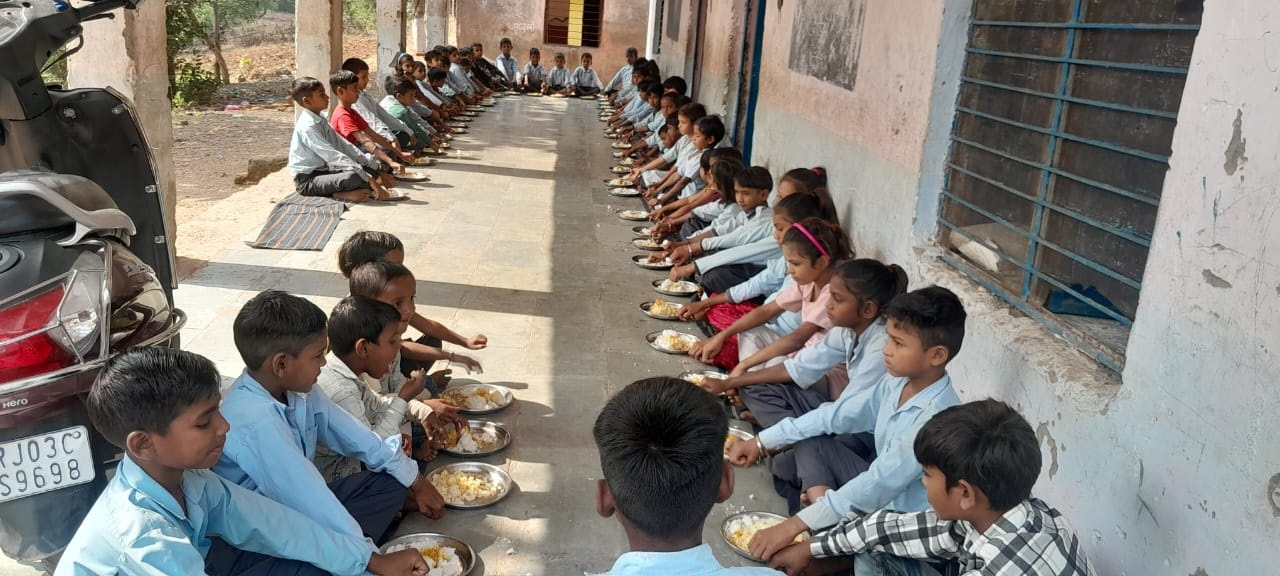
Banswara: The implementation of the Mid-Day Meal (MDM) scheme in Rajasthan's government schools is facing increasing challenges due to soaring inflation. While wheat and rice are provided by the state government, the cost of essential ingredients such as oil, spices, gas cylinders, fruits, and vegetables has significantly impacted the smooth running of the scheme.
Demand for Increased Honorarium for Cooks and Helpers, and Doubling of Conversion Amount
Naveen Kumar Sharma, State General Secretary of the Rajasthan Teacher's Association (Siyaram), stated that as inflation rises, it has become essential to increase the honorarium for cooks and helpers, and double the conversion amount. Currently, cooks and helpers are paid a meager monthly honorarium of ₹2,143, which translates to just ₹72 per day, significantly lower than the daily wages of unskilled laborers at ₹769. Additionally, payments to these workers are delayed by up to six months, which discourages many from continuing in their roles, forcing school management and School Management Committees (SMC) to make alternative arrangements to run the MDM scheme.
Sharma further stressed that the conversion amount provided for food per student is insufficient given the rising prices of essential commodities. Currently, students in grades 1-5 receive ₹5.45 per day, and students in grades 6-8 receive ₹8.17. These amounts do not cover the increasing costs of vegetables, pulses, oil, and spices. Therefore, increasing the conversion amount and expanding the scheme to include students in grades 9-12, especially in tribal-dominated areas, would be a fair and necessary step.
Demand for Hiring Cooks and Helpers in Vacant Posts of Class IV Employees
Educationalist Siyaram Sharma also proposed that the Rajasthan government should fill the vacant positions of Class IV employees, nearly 58,692 posts, with cooks and helpers. This would ensure justice for those who have been working as cooks and helpers for years and guarantee them a fair honorarium of ₹23,465 per month, which is in line with the wages of unskilled laborers.
Impact of Rising Prices on Student Meals: Lack of Fruits and Vegetables
The MDM scheme, which provides meals to students from grades 1 to 8 in government schools, was designed to encourage regular school attendance and provide adequate nutrition. However, the soaring prices of essential food items are affecting the meal plans. The costs of vegetables, pulses, oil, and spices have risen significantly in the past year, and this is being reflected in the meals served to students. Due to inflation, schools are cutting back on the quantity and quality of food, and fruits and vegetables are no longer being served regularly.
Weekly Meal Menu Affected by Price Hikes
The Education Department has set a weekly menu for MDM meals: Monday (roti and vegetables), Tuesday (dal-chawal), Wednesday (dal-roti), Thursday (khichdi), Friday (dal-roti), and Saturday (vegetable roti). Under the scheme, students are supposed to receive fruits and green vegetables twice a week. However, due to rising costs, schools are unable to provide these as part of the daily meal.
Current Budget Allocation for Food Items
The Education Department allocates ₹5.45 per student for grades 1-5 and ₹8.17 per student for grades 6-8 for food materials. These amounts cover the cost of oil, dal, spices, and gas cylinders. However, with the rising costs of fruits and vegetables, this allocation has become insufficient.
No Increase in Cooking Conversion Amount Despite Rising Costs
Despite the rising market prices, there has been no significant increase in the cooking conversion amount. As a result, teachers and school management are struggling to provide quality meals. In some schools, the bread is being served in smaller portions, and the dal has more water than usual. Fruits, once a regular part of the meals, have almost disappeared from the menu.
In October 2022, the conversion amount for cooking was raised, but no substantial changes have been made since. This has led to frustration among teachers and parents alike. Education officials monitor the quality of food and the ingredients, but the budgetary shortfall remains unaddressed.
Inflation Hits the Cost of Spices and Ingredients
Some of the key price hikes include:
New Policy on Meals: A Day Off from the Regular Menu
Starting this week, the Education Department has granted school management the option to serve meals of their choice one day a week. While the regular weekly menu remains in place, the institution head can now choose to serve a different meal on one day of the week based on local preferences.
Additionally, the department has updated the fruit-serving policy, now mandating that fruits be served on Thursdays, which was previously on a rotating basis.
Guidelines for Cooks and Helpers
The Education Department has set the following guidelines for hiring cooks and helpers: For schools with up to 50 students, one cook is required; for schools with 51-150 students, two cooks and helpers are required; and for schools with over 400 students, one additional cook and helper is required for every 150 students.
Currently, cooks and helpers are paid ₹2,143 per month, with payments being delayed for up to 10 months.
Call for Increased Honorarium and Regularization
In light of the rising inflation and the challenges faced by cooks and helpers, there is a demand to increase their honorarium to ₹23,465 per month (equivalent to the minimum daily wage for unskilled laborers, ₹769) and to absorb them into the regular pay scale for Class IV employees. This step, advocates say, would ensure justice for the workers and improve the quality of the Mid-Day Meal Scheme.